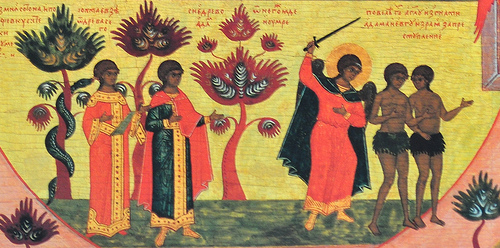Stephen Hayes's Blog, page 49
March 8, 2015
Armed robbery at the monastery
On the night of 6-7 March 2014 armed robbers broke into the premises of the Monastery of the Descent of the Holy Spirit in Gerardville, south-west of Pretoria, and shot Artemius Mangena, the caretaker. They robbed him of his clothes and cell phone, broke several windows, and took a few other things, and left.
After they shot him, Artemius stopped fighting the robbers, and lay on the floor bleeding, pretending to be dead. He was found the following morning by Victor, who was also staying there, and Victor ran to the neighbours for help, and they phoned the Neighbourhood Watch and the police. They learned that there had been several other robberies in the area that night, possibly by the same gang, and that in one of them someone had been shot and killed.
Artemius was taken to the Kalafong Hospital in Atteridgeville, and Fr Elias Palmos and I visited him this morning after the Divine Liturgy at the monastery church.

Fr Elias visiting Artmius Mangena in hospital after he was shot by robbers
Artemius told us that there were about six robbers altogether, though he fought with only two of them who came into the room where he was sleeping and shot him, The others went around breaking windows. He said they were speaking Shona, which suggests that they were probably Zimbabweans. The broke one window in the church, but do not seem to have taken anything from it. The took food from the kitchen, however.
Artemius is being treated for bleeding in his lung, and is in considerable pain. He lost quite a lot of blood, and we are grateful that he is still alive and with us. He serves as a reader at the Atteridgeville mission congregation, when he is not looking after the monastery.

Buildings at the monastery at Gerardville that armed robbers broke into.
There is a lot of crime, and and so incidents like this are not all that unusual, and as I said, there were other robberies and a murder, probably by members of the same gang, on the same night. About a week earlier there was a hijacking of a bus at a spa not far away, and the passengers were robbed. This was not necessarily by the same gang, but it shows that there is a lot of crime in the area. There have been break-ins at the monastery before, but this is the first time anyone has been seriously hurt.
We have asked people to pray for Artemius, and for his recovery, and for safety of people staying at the monastery. There are no monks staying there now, though there have been in the past, and we hope there will be more in future.
Apart from its immediate effect, this incident also highlights some of the problems related to crime in South Africa, apart from the crime itself, which is a serious problem that needs to be tackled.
One problem is that the robbers were apparently Zimbabweans, which reinforces the perceptions of many South Africans that immigrants are responsible for the increase in crime. This is not peculiar to South Africa. Some years ago we stayed at a guest house in Mitikas, on the west coast of Greece, and the owner, locking the door for the night, brought his motorbike inside, “or else the Albanians will steal it”. We deplore the level of xenophobia in South Africa, and the violence that it sometimes leads to, but violent crime committed by foreigners also leads to an increase in xenophobia.
There is also something even more disturbing.
If Artemius had been white, he might have been added to the statistics collected by bodies like Genocide Watch, who publicise such incidents, but only when whites are the victims, to bolster their claims that there is genocide of white people in South Africa. Web pages like that one at Genocide Watch are clearly calculated to fan the flames of racism and racial hatred, and are used for that purpose.
So there is not only the harm caused by the crime itself, but also the racism and xenophobia that such crimes tend to stir up.

March 7, 2015
Not all atheists are militant atheists
Militant evangelising atheists like Richard Dawkins and Sam Harris have been in the news a lot recently. They obviously care, and care very deeply, about the gods that they think people should not believe in. It is therefore good to be reminded that the vast majority of atheists couldn’t give a toss.
What scares the new atheists | John Gray | The Guardian:
Roughly speaking, an atheist is anyone who has no use for the concept of God ��� the idea of a divine mind, which has created humankind and embodies in a perfect form the values that human beings cherish and strive to realise. Many who are atheists in this sense (including myself) regard the evangelical atheism that has emerged over the past few decades with bemusement. Why make a fuss over an idea that has no sense for you? There are untold multitudes who have no interest in waging war on beliefs that mean nothing to them. Throughout history, many have been happy to live their lives without bothering about ultimate questions. This sort of atheism is one of the perennial responses to the experience of being human.
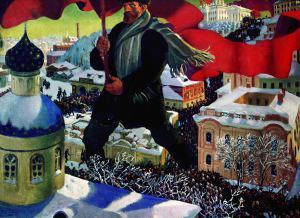 There have been militant atheists around for quite a long time, of course, and militant atheism has been quite popular, especially when that position has been regarded as politically correct, as it was in the USSR, where the League of Militant Atheists saw its membership grow into millions.
There have been militant atheists around for quite a long time, of course, and militant atheism has been quite popular, especially when that position has been regarded as politically correct, as it was in the USSR, where the League of Militant Atheists saw its membership grow into millions.
But it would be a mistake to see all atheists as a kind of organised irreligion.
Militant atheists, who are very vocal, might give the impression that there is such a thing a organised irreligion, but as the author of the (very good)�� Guardian article points out, atheism is characterised by an absence of something. As someone pointed out, if atheism is a religion, then bald is a hair colour.
If you want a comparison, atheists are a bit like people who don’t like ballet, and can’t see the point of it. So most people who don’t like ballet won’t buy tickets to see the shows, they won’t talk about ballet, and will tend to regard ballet fans as eccentric at best and as rather tiresome bores at worst. The last thing that most of them would do would be to campaign for bans on advertising ballet shows and ballet classes, or write books and give lectures on the evils of ballet. In the same way, common or garden atheists, the non-militant ones, are quite happy to live and let live. The word atheist means someone who is without God or gods. It is an absence rather than an antipathy.
There is a tendency for extremists to get more publicity in the world today. Militant Islam gets a lot of publicity in the Western media, so people in the West tend to think that all Muslims are militant. They’ve even coined a new word for militant Muslims — Islamists. Perhaps the militant atheists should rather be called “antitheists” to avoid giving the common or garden atheists a bad name.

February 23, 2015
The new martyrs of Libya
The first ikons of the 21 new martyrs of Libya have already begun to appear on social media sites on the internet. Here is one posted by Rijo Geevarghese on Facebook.

The 21 martyrs of Libya
Rijo Geevarghese also notes
ISIS announced the execution of 21 Copts but only 20 names were confirmed, most of them were from the province of Minya (Upper Egypt). There was an inaccuracy in the number of Egyptian hostages; there were only 20 Egyptians (Copts). Then who was this remaining one non-Coptic victim?
Ahram-Canadian News was able to gather information about this man. He was a Chadian citizen (darker skin shown in picture) who accepted Christianity after seeing the immense faith of his fellow Coptic Christians to die for Christ. When the terrorist forced him to reject Jesus Christ as God, looking at his Christian friends he replied, “their God is my God” so the terrorist beheaded him also.
Such things are nothing new.
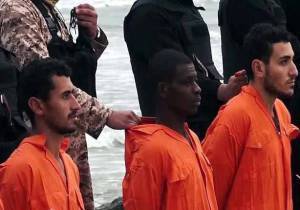
Some of the 21 new martyrs of Libya
Many Christians have been killed for their faith in Egypt and Libya, from the beginning of the Christian faith in those parts until now.
Such things have also been happening in neighbouring countries for centuries. Westerners often forget that Christianity is a Middle Eastern religion, and speak of “Christendom” as if Christians were powerful. But Christians have long been an oppressed minority in the lands where Christianity first spread, mand many have been called on to die for Christ.
Perhaps a fitting memorial for the new martyrs is an anthem composed for the martyrs of many centuries ago:
Let thy servants praise thee, O Lord.
O holy martyrs and teachers of faith, pray that there may be peace in creation.
Let wars be brought to naught and contentions cease among us.
And may the church sing praises by the mouth of her children.
And thy saints give thanks unto thee.
May the holy martyrs who confessed thee in their afflictions
and propitiated thee by the blood which their necks poured forth
make request for sinners to thee, O our Lord
that in the day of judgement thou mayest forgive their trespasses.
Let them speak of the glory of thy kingsom.
The martyrs saw the glory of the kingdom in their minds
when they were being killed by their persecutors
and they joyfully endured the tortures in their bodies
and our Lord Jesus Christ received their spirits.
Honoured is their blood in his sight.
Let us diligently honour with songs of the Holy Spirit
the bones of the martyrs who endured afflictions
that we may find help in the day of recompense of their labours
from the goodness of the mercies of God.
The Lord on high is glorious.
On high are your crowns and in the world are your assemblies
O martyrs, preachers of Christ the King.
On high, and to the deep, lo your feasts are celebraterd.
O sowers of peace in the four quarters of the earth.
Seek the Lord and be strengthened.
O martyrs, seek for mercy from the merciful God
that he may make his peace to dwell in the four quarters of the earth.
And when our Lord is revealed and the clouds bear up your bodies
pray that with you we may inherit the kingdom.
My voice shalt thou hear in the mornings, O Lord
In the morning the martyrs cried in the judgment hall before the persecutors
We will not deny the Heavenly Bridegrooom
For it is he who delivereth us from the hands of the ungodly
and clotheth our bodies with glory in his kingdom.
(from East Syrian Daily Offices: Wednesday Matins)

February 21, 2015
The Expulsion of Eve and Adam from Paradise
 Originally posted on Fr. Ted's Blog:
Originally posted on Fr. Ted's Blog:
The Sunday before we enter into Great Lent has the theme of the expulsion of Adam and Eve from Paradise. �� Early church writers imagined��that Paradise was a temple which God had built so that we could worship Him. ��God���s expelling Eve and Adam from the Edenic temple was not done for punishment but rather to make us long for God and our lost relationship with Him.�� On earth, we experience the absence of God and so seek for Him.�� Liturgy and the church sanctuary are where we look to find God.
So repentance and the prayer life are natural ways which God provided for us on earth to seek Him and to work to re-establish the proper relationship with Him. �� Priest and Professor��Baby Varghese writes about the wisdom of St. Ephrem the Syrian regarding the Fall:
���When Adam and Eve trusted the word of Satan instead���
View original 284 more words

February 18, 2015
Un-kudos to the City of Tshwane
Advice to the city fathers (and mothers) of the Great City of Tshwane: when you send out notices to people saying that their light and water accounts must be paid by a certain date, then cut off their electricity three days after the due date, not three days before. This is not rocket science, it is common sense.
A few months ago we said kudos to the City of�� Tshwane because of the good things they were doing, saving jacaranda trees and helping residents whose houses had been damaged in hail storms. Now we would like to withdraw some of that kudos.
I���m not sure whether kudos can be quantified like that. Strictly speaking you either have it or you don���t. But this week the City of Tshwane switched off our electricity for several days.
It was another of the good ideas that they had, but this time it went wrong.
Towards the end of last year there was a post office strike, which meant that, among other things, municipal light and water accounts were not delivered. At the end of each month we paid about R1400, which was about the average of earlier accounts that we had received,
The municipality had a good idea: they sent Val and SMS on her cell phone to say that the account needed to be paid by the 19th of February. That bypassed the post office strike. Good thinking.
So on Monday 16th we paid the account, three days before the due date. And on that very day they cut off the electricity for non-payment, three days before the date they had given as the due date. Good thinking, bad implementation.
And though they jumped the gun in cutting off the electricity, they were very slow off the mark in restoring it.
We phoned them, and they said they wanted proof that the account had been paid. Val drove to the nearest Internet cafe, scanned the autoteller receipt and sent it to the e-mail address they gave. Several hours later there was still no electricity. She phoned again. Different bloke answers, Says they haven���t received it, send a photo of the autoteller slip from your cell phone, to a different address this time. Val did so, though the battery on her cell phone was dying. But it seems that the City of Tshwane���s e-mail system doesn���t like attached photos and bounces it back.
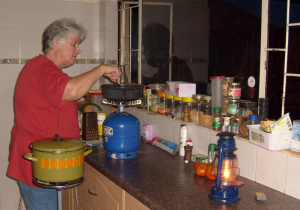
Val cooking macaroni & cheese for supper
Next morning Val goes back to the Internet cafe, sends copies to both blokes, this time with photos of the slips in zipped files. Also sends it by fax, and goes into the ���Customer Care��� web site and explains what has happened, and tries to fax it to them as well. The fax number given on the web site is apparently not working. The kudos drops still further.
She gets home and phones them from the landline, and they say that yes, they see that payment has been received, and a technician has been informed to turn the electricity on again. There will be a reconnection fee of R655.00.
Well, I���m typing this the following morning, 18th February. According to the notification sent by the municipality, the account is due to be paid tomorrow. It was paid two days ago, and we still have non electricity. My laptop battery has 24% remaining.
We read in the newspapers that other municipalities, like Johannesburg have problems with the municipal billing system, and that people have been complaining. Up till now we have had no complaints about the City of Tshwane. Yes, we haven���t received accounts for several months, or received them late, but you can���t blame the municipality for a postal strike.
We also read that municipalities and Eskom are owed millions in unpaid electricity accounts.
In the case of the City of Tshwane, at least, I don���t believe it. They are cutting off the electricity before the accounts are due, and must be making a fortune in reconnection fees. They can���t be owed any money, if that is what they are doing to all their customers. Scratch the kudos;. Boo. Hiss.

February 10, 2015
The new crusaders of the West
In the last few days lots of people seem to have been posting links to articles about the Crusades on Facebook. The first one I saw was The Real History of the Crusades | Christianity Today:
within days of the September 11 attacks, the Middle Ages suddenly became relevant.
As a Crusade historian, I found the tranquil solitude of the ivory tower shattered by journalists, editors, and talk-show hosts on tight deadlines eager to get the real scoop. What were the Crusades?, they asked. When were they? Just how insensitive was President George W. Bush for using the word crusade in his remarks?
That was actually quite an old article, published in 2005, and referred to US President George Bush calling his “war on terror” a “crusade”.
Then came a link to this book review Inventing the Crusades by Thomas F. Madden | Articles | First Things:
It is generally thought that Christians attacked Muslims without provocation to seize their lands and forcibly convert them. The Crusaders were Europe���s lacklands and ne���er-do-wells, who marched against the infidels out of blind zealotry and a desire for booty and land. As such, the Crusades betrayed Christianity itself. They transformed ���turn the other cheek��� into ���kill them all; God will know his own.���
Every word of this is wrong. Historians of the Crusades have long known that it is wrong, but they find it extraordinarily difficult to be heard across a chasm of entrenched preconceptions.
I’m not sure about “every word” being wrong, but certainly the first four words are: “It is generally thought…”
With even a rusty undergraduate knowledge of the crusades, that looks like a straw man to me. “Generally thought” by whom?
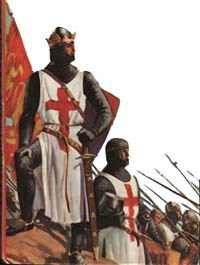 Everything I learned about the crusades, from primary school to university, made it clear that there was Muslim provocation that sparked off the crusades.
Everything I learned about the crusades, from primary school to university, made it clear that there was Muslim provocation that sparked off the crusades.
Such statements look more like polemics than history.
The book being reviewed there was The Crusades, Christianity, and Islam by Jonathan Riley-Smith. I haven’t read it, so I can’t say whether the author takes the same line as the reviewer; my comments here pertain to the review, rather than to the book itself.
One of the things one learns about historiography is that most historians, even the most academically respectable ones, carry “the burden of the present”, that is, the need to interpret the past in such a way as to justify or advocate4 some present course of action. It is only to be expected that we interpret the past in the light of the present — after all, we3 know what happened next, which people at the time did not. Few people read stories about the past that have no bearing on the present.[1]
But when the article goes on to say,
One of the most profound misconceptions about the Crusades is that they represented a perversion of a religion whose founder preached meekness, love of enemies, and nonresistance. Riley-Smith reminds his reader that on the matter of violence Christ was not as clear as pacifists like to think. He praised the faith of the Roman centurion but did not condemn his profession. At the Last Supper he told his disciples, “Let him who has no sword sell his cloak and buy one. For I tell you that this Scripture must be fulfilled in me, And he was reckoned with transgressors.”
St. Paul said of secular authorities, “He does not bear the sword in vain; he is the servant of God to execute his wrath on the wrongdoer.” Several centuries later, St. Augustine articulated a Christian approach to just war, one in which legitimate authorities could use violence to halt or avert a greater evil. It must be a defensive war, in reaction to an act of aggression. For Christians, therefore, violence was ethically neutral, since it could be employed either for evil or against it. As Riley-Smith notes, the concept that violence is intrinsically evil belongs solely to the modern world. It is not Christian.”
… then what we are seeing is not a historian’s study of past events, but a theological framework, and the theological filters through which those events are seen by someone writing in the present in order to justify a present agenda.
It seems to me that the “burden of the present” carried by this article, and other similar ones being circulated on the Internet, is the need to justify the increasing belligerence and warmongering by the West that we have seen in the last 25 years.
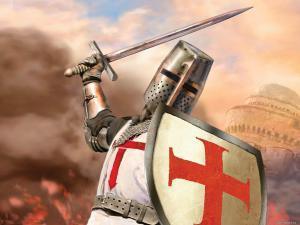 Western imperialism has been around a lot longer than the last 25 years, of course, but it “went underground” to some extent during the Cold War. There was no Nato bombing of Allende’s Chile, for example. One could say that naked imperialism became less fashionable after 1914, when many colonised countries struggled for independence, and the rise of Nazism and Fascism (and to some extent Bolshevism) made the ugly face of imperialism plain for all to see.
Western imperialism has been around a lot longer than the last 25 years, of course, but it “went underground” to some extent during the Cold War. There was no Nato bombing of Allende’s Chile, for example. One could say that naked imperialism became less fashionable after 1914, when many colonised countries struggled for independence, and the rise of Nazism and Fascism (and to some extent Bolshevism) made the ugly face of imperialism plain for all to see.
That lasted until 1989, the annus mirabilis, when there was a brief flowering of freedom around the world, symbolised by the fall of the Berlin Wall. It lasted about 6-8 months, until it was overtaken by the Iraqi invasion of Kuwait and the Wars of the Yugoslav Succession. And since then Western imperialism has been growing again, and growing more visibly, so now there is a need to justify it, inter alia by rewriting the history of the crusades.
The review seems to be aimed at discrediting Christian pacifism and promoting Christian militarism.
I can’t argue about what happened during the crusades with specialist scholars like Jonathan Riley-Smith, whose bibliography on the subject is pretty impressive. What I do take issue with is some of the assertions about what is “generally thought”. This is akin to the clickbait you see on Facebook “Eight things you didn’t know about….” and when you click on the link you find that you did know all eight and a few more besides.
I learnt about the crusades in history in primary school, and I was called upon to write undergraduate (and a couple of postgraduate) essays on the crusades about every year from 1961 to 1968, and often answer exam questions about them too. That obviously can’t compare with the erudition of specialist scholars, but one thing I clearly recall from all those efforts is that the first crusade was�� sparked off because the Muslim rulers of Jerusalem had barred access to Western pilgrims, and that at a time when pilgrimage was a Very Big Thing among Western Christians. That was clearly provocation, and the idea that the crusades were “unprovoked” was the last one that anyone could get.
And that is why I think the “generally thought” bit is a straw man.
If you want to go into more detail, it was the Seljuk Turks who conquered the Fatimid (Muslim) and Roman (Byzantine) rulers of Anatolia, Syria, and Palestine, and massacred Christian pilgrims after they had taken over. The change of policy towards Christian pilgrims was occasioned by a change of rulers. It wasn’t so much that they were Muslims as that they were Turks. The Fatimids had generally had a policy of religious tolerance towards Christians, Jews, and other Muslim sects; the Seljuk Turks did not. So it wasn’t so much Muslim provocation as Turkish provocation that led to the first crusade. But it was provocation, as even history books written for 10-year-olds made clear
The Crusades also made a big impact on Western culture, in a way that I did not fully appreciate when I was in primary school, and only discovered much later. For example, as a child I read stories about King Arthur, and all the illustrations showed them dressed like crusaders. Of course the Arthurian stories were gathered, edited and published at the time the crusades were at their height, and so they too carry the “burden of the present”.
The impact of the crusades in Eastern Christian culture has been somewhat different. The Roman Empire, under attack from the Seljuks, asked for help from Western Christian rulers, but the so-called “filioque” split of 1054 was still a living memory at the time of the First Crusade, and the crusaders appointed their own Latin bishops to the lands they conquered, and regarded and treated the native Christians as heretics.
So Orthodox Christians might well look askance at this new enthusiasm for the crusades in the West.
===
[1] see Wright, Harrison M. 1977. The burden of the present: liberal-radical controversy over southern African history. Cape Town: D. Philip.
Dewey: 968.0072 WRIG
An examination of historical revisionism in Southern Africa.

February 7, 2015
Andre Brink: A dry white season
 A Dry White Season by Andr�� Brink
A Dry White Season by Andr�� Brink
My rating: 5 of 5 stars
I read this book 34 years ago, but with the death of Andre Brink it’s perhaps time to write a review of it. I will, however, have to write it from memory, because I lent my copy of the book to someone soon after I’d read it and never got it back.
The great merit of this book is that it tells it like it was.
It is an absolutely true-to-life story set in South Africa of the late 1970s. It is told from the point of view of an Afrikaner school teacher who gradually discovers what lies just under the surface, of society, which at first he can’t believe. He thinks there must be some mistake, this sort of thing can’t happen. But as he gets drawn in he discovers that such things not only can happen, but they do. And eventually they not only hasppen to other people, they happen to him.
In a way it is a South African version of Franz Kafka‘s The trial, though without the surreal element. Brink writes soberly, without exaggeration, without hype, but it is absolutely authentic. This is how it was. The incidents it describes are not factual, but they are utterly truthful.
A film was made of it, but because it was filmed in the time of apartheid, it is as inauthentic as the book is authentic, because it was filmed in Zimbabwe.
I think that is one film that really does deserve a remake, in a South African setting, with South African actors. Some remakes I’ve seen, like The taking of Pelham 1 2 3, or The flight of the Phoenix were unnecessary, and no better and in some ways worse than the originals. But this one cries out for a remake.
One of the problems with the film of A dry white season is that it was set in an English-style private prep school, where the kids wore English school caps, and the setting was horribly unlike an Afrikaans high school, and so missed the point. When I read the book I pictured the kids in the brown and gold blazers of Helpmekaar Hoerskool. I’m not sure what Andre Brink pictured when he was writing it, but Helpmekaar would have been an authentic seeting.
It will perhaps be more difficult to find an authentic black township nowadays, as many of the locations are very different from what they were like in the 1970s, so it needs someone to do it soon.

February 2, 2015
Farewell to Father Athanasius
Fr Athanasius Akunda, who has served in South Africa for nearly 13 years, will be leaving us after Pascha to serve at the Patriarchal Seminary “Makarios III” in Nairobi, Kenya. We will be sad to see him go, but wish him well in his new work.
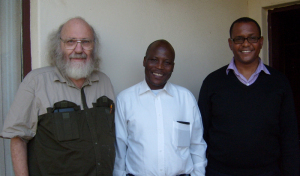
Deacon Stephen Hayes, Fr Athanasius Akunda, Fr Evangelos Thiane
The Dean of the seminary, Fr Evangelos Thiane, came to spend about a week in South Africa to meet Fr Athanasius. Fr Evangelos preached at St Nicholas, Brixton last Sunday. This was very good, for a number of reasons. Fr Evangelos was able to see the work that Fr Athanasius has been doing, which means that Fr Athanasius will be working with someone who knows where he is coming from, and what he has left behind. And people at St Nicholas, where Fr Athanasius has served since 2008, were able to see who Fr Athanasius will be working with in the coming years.
Fr Athanasius was born in Bunyore, in eastern Kenya near the Uganda border, and attended the seminary in Nairobi, where he was ordained deacon by Archbishop Seraphim, then Archbishop of Kenya. Fr Athanasius then went to study at Holy Cross Seminary in Brookline, Massachusetts, USA.

Fr Evangelos Thiane preaching at St Nicholas of Japan Orthodox Church in Brixton, Johannesburg, 1 Feb 2015
Archbishop Seraphim had in the mean time been appointed as Archbishop of Johannesburg and Pretoria, where a group of leaders of the African Orthodox Episcopal Church, led by Archbishop August Thamaga, had asked to be received into the Orthodox Church. They had originally asked to be taught Orthodox theology, of which they knew little, but the problem was that there was no one in the diocese who could teach them. Most of the priests spoke very little English, and in any case were busy with their parish duties. So Archbishop Seraphim asked Deacon Athanasius to come to the Archdiocese as a missionary teacher. Deacon Athanasius was multilingual, speaking Lunyore (his mother tongue), Swahili (the lingua franca of East Africa), English and Greek.

Johannes Baloyi, Archimandrite Athanasius Akunds, Protopresbyter Evangelos Thiane
It also seemed appropriate, because the African Orthodox Church (AOC) in both South Africa and Kenya had been started by Bishop Daniel William Alexander of Kimberley. The Kenyan branch had become part of the Patriarchate of Alexandria in 1946, but the South African branch had split into at least six different deniominations, of which the African Orthodox Episcopal Church (AOEC) was one.
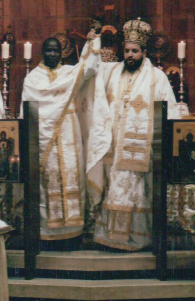
Axios! Ordination of Fr Athanasius to the priesthood at Pantanassa Church, Melrose, Johannesburg, by Archbishop Seraphim of Johannesburg and Pretoria. 14 July 2002
Deacon Athanasius arrived in South Africa on Ascension Day 2002, and found lodgings in Soshanguve, 30 km north-west of Pretoria, and began teaching the the local congregation there and other leaders. Within a few months he was ordained priest by Archbishop Seraphim and many people in Soshanguve were baptised. In May 2003 Fr Athanasius and I held a week-long course for leaders, mainly of the AOEC, but also from some of the established parishes in Johannesburg. This was very useful, but unfortunately was never followed up.
In May 2003 a Catechetical School was started, originally in Sophiatown, but it later moved to Yeoville, and Fr Athanasius was put in charge of it. It was a full-time residential course, and so Fr Athanasius was unable to continue his teaching ministry in Soshanguve. In Yeoville, however, the Catechetical School chapel also became the centre for a local congregation that gathered at the school, and Fr Athanasius led the students in outreach to the local community.
It was perhaps the wrong time for such a project, as none of the students at the school continued in active full-time ministry in the church, but it was a good witness in the local community in a time of xenophobia. Yeoville was a multicultural community and the Catechetical School was a microcosm, with students not only from South Africa, but from various other countries, including Zimbabwe and the Democratic Republic of Congo. Eventually the school closed, as Fr Athanasius was the only full-time teacher, and all the others were part-time.

Teachers and students at the Catechetical School in Yeoville
Fr Athanasius also registered to study for a doctorate in theology in missiology at the University of South Africa (Unisa), with a thesis on Orthodox dialogue with Bunyore Culture, on the inculturation of Orthodox Christianity in western Kenya. I was his co-promoter, and so he was my teacher, my student, my colleague and my friend. He graduated with a DTh degree in October 2010.
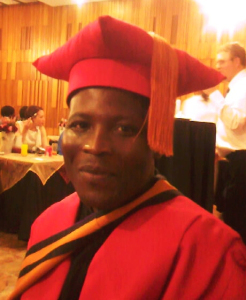
Fr Athanasius at his graduation at Unisa, 4 October 2010
In 2008 Fr Mihai Corpodean, who had been the parish priest at St Nicholas of Japan Orthodox Church in Brixton, left South Africa for New Zealand, and Father Athanasius became the parish priest there. St Nicholas was founded as a mission parish, and Father Athanasius encouraged the parish in its missionary outreach in the neighbourhood, with youth activities and social service to the poor.
When the African Orthodox Episcopal Church was asked to be received into the Patriarchate of Alexandria in 1997 its Archbishop, August Thamaga, became a layman, and was baptised as Simon Thamaga, and he and his assistant, Johannes Rakumako, were later ordained as priests in the Orthodox Church when Fr Athanasius left Soshanguve to take charge of the Catechetical School.
Fr Simon Thamaga died in September 2004, and Fr Johannes Rakumako died in April 2011, and so Fr Athanasius resumed his ministry in Soshanguve, going usually on one Sunday each month to serve the Divine Liturgy there, and to teach the leaders in the congregation. His leaving will leave a grave gap there.
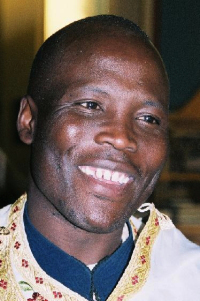 On the positive side, Fr Athanasius’s rich and varied pastoral experience during his time in South Africa will surely be an asset as he teaches at the seminary in Nairobi, preparing students from various parts of Africa for ministry.
On the positive side, Fr Athanasius’s rich and varied pastoral experience during his time in South Africa will surely be an asset as he teaches at the seminary in Nairobi, preparing students from various parts of Africa for ministry.
So we also pray for someone to replace him here, and with all that he was doing, it will probably need three people to replace him — a parish priest for St Nicholas in Brixton, a mission coordinator for the Archdiocese, and a travelling teacher and preacher, visiting places like Soshanguve, Bloemfontein and Maputo in Mocambique.
For more on different aspects of Fr Athanasius’s ministry in South Africa, see:
Church planting in Madidi | Khanya
Baptism in Brixton | Khanya
St Nicholas Orthodox Church, Brixton: 25th anniversary | Khanya

January 28, 2015
Berlin: whodunit with a difference
My rating: 5 of 5 stars
This is a whodunit with a difference. Well, with several differences. It’s about a serial killer, and quite a lot of crime novels are about that.
The most notable difference is that it pays as much attention to the victims as it does to the killers or the cops.
In many crime novels the victims are simply dead bodies, and the police investigating the crime have to identify them to find out who they were, and very often the reader knows little more about them than the police. In this case, however the story deals with them as real people with a history. One effect of this is to make one conscious of the enormity of murder. It is not simply a puzzle to be solved. It brings to an end, unexpectredly and with little warning, the life of a person with hopes and fears and loves and relationships.
Another difference is that it is set in Berlin in 1945, immediately after the end of the Second World War. After so much killing on an industrial scale, it requires a change of mental gears to deal with peacetime crimes. When so many people have died violent deaths in the previous few months, what do one or two more matter? So it is about a society in transition, and seeking to recover mormality.
Another difference, related to the last, is that it gives a picture of life in Berlin, not merely at the time in question, but over the previous 20 years. It shows how ordinary people responded to the rise of the Nazis to power, their behaviour in power, and how they responded to the war. I think that, quite apart from the plot and the characters, which are very good, this aspect of the setting may be the best feature of the book.
How do I know this?
I was 4 years old in 1945, and did not visit Germany until 20 years later. So how can I judge that the picture of life in Nazi Germany is accurate and authentic?
I think I can know by extension. I know that A Dry White Season tells it like it was in apartheid South Africa, even though it is a work of fiction, because I lived through the period. And this book has the same flavour of authenticity. It shows the ambiguities and inconsistencies and contradictions of living in an increasingly authoritarian society, and is worth reading for that alone.

January 25, 2015
Pay back the money: the Pope and the President
Summary of a sermon preached in Mamelodi East, Tshwane, on the Sunday of Zacchaeus, 2015.
33rd SUNDAY AFTER PENTECOST ��� Tone 8. St. Gregory the Theologian, Archbishop of Constantinople (389). Sunday of Zacchaeus.
1 Timothy 4:9-15
Luke 19:1-10
If we watch the news on TV, or read the newspapers nowadays, we will see that one thing that politicians are saying to each other a lot is “Pay back the money.” They accuse each other of misusing money that was paid by the taxpayers, and then demand, loudly and publicly, “Pay back the money.”
What we don’t read about in the newspapers is that any of them did pay back the money.
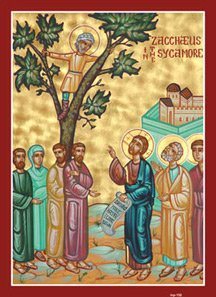 In today’s Gospel, by contrast, we read about Zacchaeus, and he did pay back the money.
In today’s Gospel, by contrast, we read about Zacchaeus, and he did pay back the money.
What is the difference between Zacchaeus and the politicians we read about in the newspapers?
The difference is that Zacchaeus saw Jesus, and when he saw Jesus, he promised to pay back the money.
Because he was short, Zacchaeus had to climb a tree to see Jesus, and not only did he see Jesus, but Jesus also saw him.
And when Jesus saw Zacchaeus he did not say, “Pay back the money”. He said “I’m coming to have lunch with you today.”
And we are told that Zacchaeus received Jesus joyfully, and without being asked to do so, he promised to pay back the money.
But when they saw it, they all complained, saying, ���He has gone to be a guest with a man who is a sinner.���
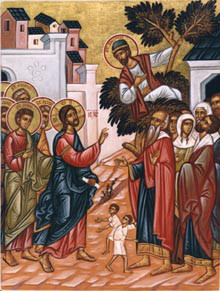 And when His Beatitude Theodoros II, Pope and Patriarch of Alexandria and all Africa, went to visit President Jacob Zuma a couple of weeks ago, they all complained, saying, ���He has gone to be a guest with a man who is a sinner.���
And when His Beatitude Theodoros II, Pope and Patriarch of Alexandria and all Africa, went to visit President Jacob Zuma a couple of weeks ago, they all complained, saying, ���He has gone to be a guest with a man who is a sinner.���
They complained on Facebook and they complained on Twitter, and perhaps they complained by e-mail and at tea parties, and even after the Divine Liturgy, after receiving Holy Communuion, because, as we all know, Jacob Zuma is one of those who has been asked to pay back the money.
Zacchaeus Sunday marks the beginning of the preparation for Great Lent, which is itself a preparation for Pascha, with the theme of repentance. We can say that the politicians should pay back the money. We can say that those who looted spaza shops in Soweto last week should pay back the money. But we really need to be looking at ourselves, and asking if we have paid back the money. And have we taken back the nasty things we have said about other people?
When Lent proper begins, on Forgiveness Sunday (22 February in 2015) we are given the opportunity to bow down to each other and ask each other for forgiveness. We can ask forgiveness of those we have wronged, and forgive those who have wronged us. During Great Lent we pray “grant that I may see my own transgressions, and not to judge my brother.”
Most of the wars, and much of the violence in the world, is caused by people being more willing to condemn the sins of other people than to repent of their own.
And Jesus said to him, ���Today salvation has come to this house, because he also is a son of Abraham; for the Son of Man has come to seek and to save that which was lost.”


